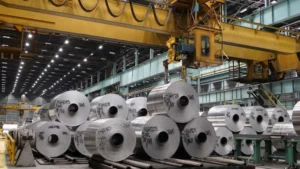 A major fire at the Novelis aluminum plant in Oswego, New York, is causing major disruptions across the U.S. automotive industry, with Ford’s highly profitable F-150 pickup truck particularly affected.
A major fire at the Novelis aluminum plant in Oswego, New York, is causing major disruptions across the U.S. automotive industry, with Ford’s highly profitable F-150 pickup truck particularly affected.
The fire, which broke out on September 16, destroyed the plant’s hot mill—a critical part of the facility responsible for producing aluminum sheets. As a major supplier, Novelis provides approximately 40% of the aluminum used by the U.S. auto industry. This prolonged shutdown poses a serious challenge for automakers, as Novelis anticipates its hot mill operations won’t restart until the first quarter of 2026.
Ford, the largest customer of the Oswego plant, is a key user of aluminum for its F-150, a vehicle that switched from a steel to an aluminum-intensive body a decade ago. The severity of the setback is expected to be addressed by Ford when it releases its quarterly financial results.
The disruption, however, extends beyond Ford. Other major automakers like Toyota, Hyundai, and Stellantis also source aluminum from Novelis. While Hyundai has stated its production is unaffected, a Toyota spokesperson noted that the company is “in pretty good shape, but not completely out of the woods,” and is working with alternative suppliers.
 This incident underscores the fragility of modern, just-in-time supply chains. The fire at a single key facility is creating a ripple effect that could impact production and revenue for some of the world’s largest car manufacturers for months to come. The market has reacted negatively to the news, with Ford’s stock seeing a decline, reflecting investor concerns over the financial implications of the outage.
This incident underscores the fragility of modern, just-in-time supply chains. The fire at a single key facility is creating a ripple effect that could impact production and revenue for some of the world’s largest car manufacturers for months to come. The market has reacted negatively to the news, with Ford’s stock seeing a decline, reflecting investor concerns over the financial implications of the outage.
While Novelis is reportedly turning to its overseas plants and collaborating with competitors to mitigate the shortage, high U.S. import tariffs on aluminum may increase costs. The full extent of the fire’s financial and production impact will likely become clearer in the coming weeks as automakers provide official updates.
















